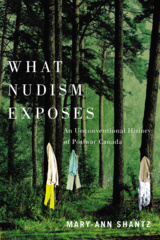
As modern versions of the settler nation took root in twentieth-century Canada, beauty became a business. But beauty pageants were more than just frivolous spectacles. Queen of the Maple Leaf deftly uncovers how colonial power operated within the pageant circuit.
In this astute critical investigation, Patrizia Gentile examines the interplay between local or community-based pageants and more prestigious provincial or national ones. Contests such as Miss War Worker, Miss Black Ontario, and Miss Civil Service often functioned as stepping stones to competitions such as Miss Canada. At all levels, pageants exemplified codes of femininity, class, sexuality, and race that shaped the narratives of the settler nation. A union-organized pageant such as Queen of the Dressmakers, for example, might uplift working-class women but immigrant women need not apply. Not unlike sports leagues linked from minor to major, pageants from local to national formed a network that entrenched white settler nationalism in the context of the beauty industrial complex.
Queen of the Maple Leaf demonstrates that these contests are designed to connect female bodies to white, middle-class, respectable femininity and wholesomeness, and that their longevity lies squarely in their capacity to reassert the white heteropatriarchy at the heart of settler societies.
Students, scholars, and researchers will want to add this significant contribution to gender and sexuality studies to their bookshelves, particularly for its insights into settler femininity.
[Queen of the Maple Leaf] is a seminal contribution to better understanding how histories of women’s bodies make for legitimate historiography of settler colonialism, truth regimes and power dynamics within Canada.
[Queen of the Maple Leaf ] will be of interest to all who study nation making in Canada as a process involving intersecting categories of subject positions.
Gentile’s compelling argument and sharp analysis of a diverse set of sources provide a rich examination of oft-trivialized beauty pageants. While Gentile hardly celebrates these events, she does allow room to consider women’s (uneven) agency.
Patrizia Gentile has written the most comprehensive critical study of Canadian beauty contests that exists. The material on workplace beauty contests and the involvement of unions is especially interesting and original.
Queen of the Maple Leaf investigates how power reproduces itself within the seemingly mundane, ordinary, or even ‘fluffy’ cultural practices. The beauty pageant can no longer be considered harmless fun.
In this analytically nimble and compellingly argued book, Patrizia Gentile makes a powerful argument for understanding beauty contests as reflective of and contributing to the shaping of white settler society. This is a timely and exciting contribution to Canadian history and cultural studies.
Patrizia Gentile is an associate professor in the Human Rights and Social Justice program and the Institute of Women’s and Gender Studies at Carleton University. She is co-author with Gary Kinsman of The Canadian War on Queers: National Security as Sexual Regulation; co-editor with Jane Nicholas of Contesting Bodies and Nation in Canadian History; and co-editor with Gary Kinsman and L. Pauline Rankin of We Still Demand! Redefining Resistance in Sex and Gender Struggles.
Introduction
1 Beauty Queens and (White) Settler Nationalism
2 Miss Canada and Gendering Whiteness
3 Labour of Beauty
4 Contesting Indigenous, Immigrant, and Black Bodies
5 Miss Canada, Commercialization, and Settler Anxiety
Conclusion
Notes; Bibliography; Index









